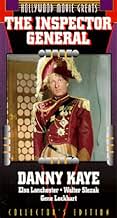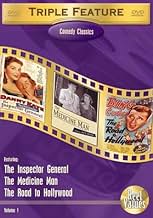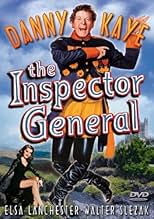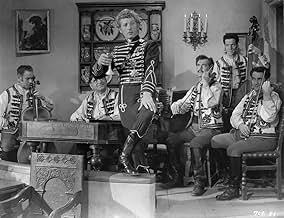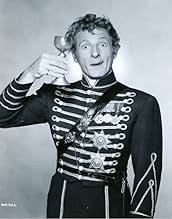VALUTAZIONE IMDb
6,7/10
3654
LA TUA VALUTAZIONE
Aggiungi una trama nella tua linguaA town's corrupt officials think a fool is actually an investigator in disguise.A town's corrupt officials think a fool is actually an investigator in disguise.A town's corrupt officials think a fool is actually an investigator in disguise.
- Premi
- 1 vittoria
Benny Baker
- Telecki
- (non citato nei titoli originali)
Oscar Blank
- Villager
- (non citato nei titoli originali)
George Boyce
- Party Guest
- (non citato nei titoli originali)
Chet Brandenburg
- Sentry
- (non citato nei titoli originali)
Leonard Bremen
- Lieutenant
- (non citato nei titoli originali)
Harriett Brest
- Villager
- (non citato nei titoli originali)
Albert Cavens
- Party Guest
- (non citato nei titoli originali)
Dick Cherney
- Sentry
- (non citato nei titoli originali)
Robert Cherry
- Peasant
- (non citato nei titoli originali)
Trama
Lo sapevi?
- QuizNikolay Gogol's play, "The Inspector General" opened in St. Petersburg, Russia. in April 1836.
- BlooperWhen Yakov first reads the note from Leza we can see it says "They are trying to kill you. Don't go near the barn." Later, when the woodchopper reads it he says "Don't go near the barn. They are trying to kill you."
- ConnessioniEdited into Your Afternoon Movie: Inspector General (2022)
- Colonne sonoreThe Medicine Show
(1949) (uncredited)
(aka "Yakov's Elixir")
Music and Lyrics by Sylvia Fine
Played by Musicians at the Medicine Show
Sung by Danny Kaye
Variations played in the score
Recensione in evidenza
This is a nice little bit of fluff. It has more Gogol in it than you might expect. It's not really tha-a-at good, but I gave it a 7 because it's *completely* harmless, and really, Danny Kaye is so lively and charming, and so few actors have that quality of total innocence. He looks quite handsome in the officer's fancy uniform (until he starts making with the funny faces). A good one for kids.
I più visti
Accedi per valutare e creare un elenco di titoli salvati per ottenere consigli personalizzati
- How long is The Inspector General?Powered by Alexa
Dettagli
Botteghino
- Budget
- 2.873.000 USD (previsto)
- Tempo di esecuzione1 ora 42 minuti
- Proporzioni
- 1.37 : 1
Contribuisci a questa pagina
Suggerisci una modifica o aggiungi i contenuti mancanti

Divario superiore
By what name was L'ispettore generale (1949) officially released in India in English?
Rispondi


